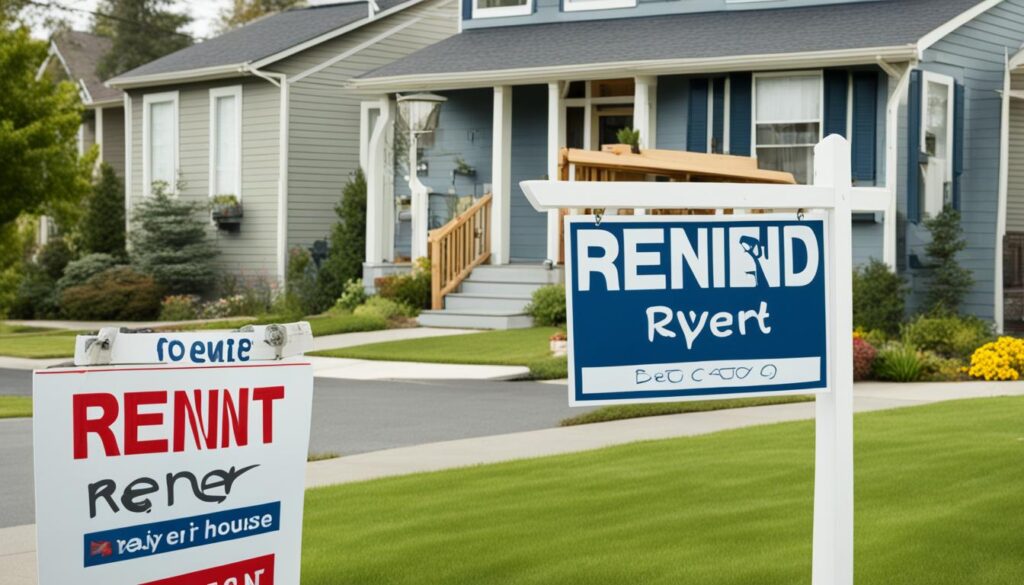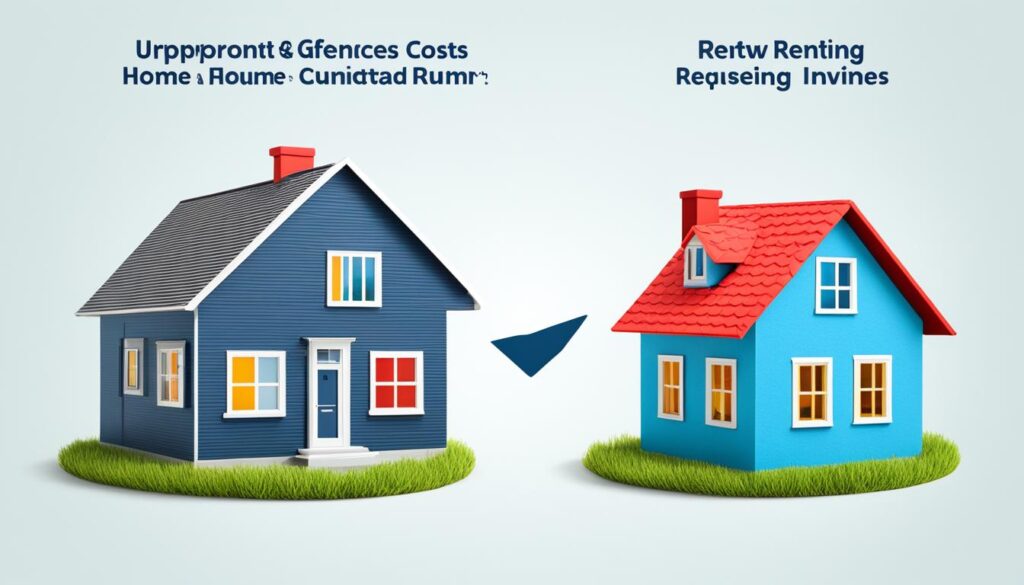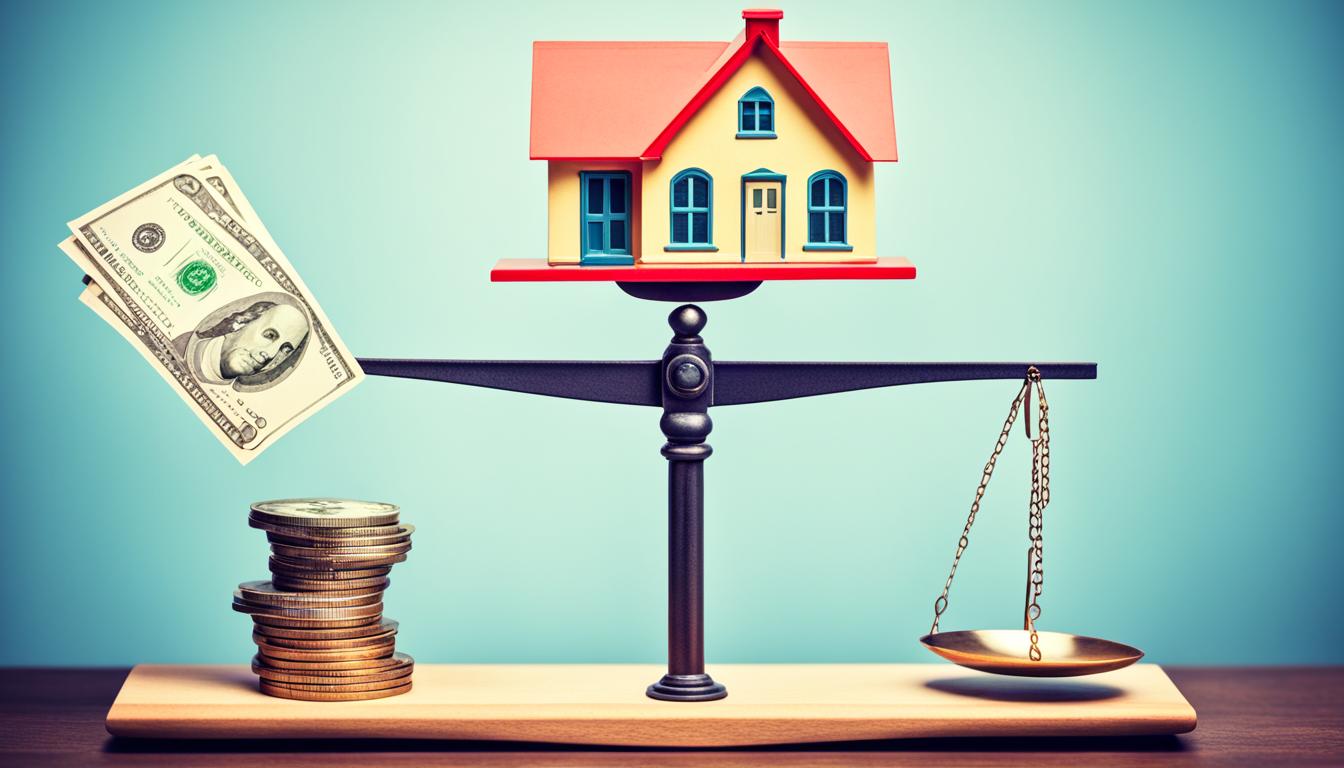Welcome to our detailed guide on the costs of renting a home versus buying one. This decision is big and knowing the financial side helps a lot. We aim to give you everything needed to choose wisely with your money and lifestyle in mind.
We will look at what it costs to rent or buy a place. We’ll dive into the good and bad of each. Everything from monthly bills to longer financial responsibilities will be discussed.
Key Takeaways:
- It’s important to compare the costs of renting and buying before making a decision.
- Renting means paying monthly rent, deposits, and utilities. Buying includes down payments, closing costs, and mortgage payments.
- There are benefits and drawbacks to both, like the freedom to move, owning versus renting, upkeep costs, and who’s in charge.
- Think about your money goals, what you want long-term, and your personal likes to pick well.
- Our calculator can help you see the financial side clearly before deciding.
The Costs of Renting
Deciding between renting and buying involves looking at the costs. Renting has its own set of expenses. These can affect your budget.
Renting costs are more than what you pay each month. Here are the expenses that could come up:
- Monthly rent: This is your main expense when you rent. It varies based on the place, size, and included amenities.
- Security deposits: A security deposit is often required. It’s usually the same as one month’s rent. This money is a backup for the landlord against possible damage or unpaid rent.
- Pet fees: Landlords might charge extra money if you have pets. This could be a one-time fee or added to your monthly rent. It’s to cover damages or extra cleaning needed because of your pets.
- Utility bills: Renters are usually the ones paying for their utilities. This includes electricity, water, gas, and the internet. The prices may change based on how much you use and where you live.
- Insurance: Though it’s not always required, getting renters’ insurance is smart. It protects your things and offers liability coverage of accidents or property damage.
When you rent, you need to think about all these costs. Now, let’s compare them to what you spend on a house if you buy.
The Costs of Buying
Deciding to buy a home means understanding the costs. You’ll need to plan for upfront costs and monthly payments. We’ll detail these costs and compare them to renting. This will help you make the best choice.
Upfront Costs
Buying a home starts with a big upfront cost. This includes the down payment, a percentage of the price you pay initially. You also face closing costs, which contain loan fees, appraisals, and more. Don’t forget about home inspection fees. They help catch issues early on, saving you from troubles later.
Ongoing Expenses
After you buy, remember the ongoing expenses. You’ll pay a monthly mortgage that covers loan and interest. Property taxes are also part of the package. Their cost varies based on your property’s location. Home insurance helps cover losses, and regular maintenance keeps everything looking good.
These expenses may feel heavy, but they help you build equity. This means your investment in the house grows over time.
Comparison with Renting
Renting offers a lower upfront cost and fewer ongoing bills. This includes skipping property tax and some maintenance. However, it doesn’t help you build equity like owning does. Buying lets you gain from market value increases and offers a stable home.
Ultimately, your choice depends on what you value most. Think about your finances, future plans, and what homeowner benefits matter to you. This analysis can guide you to a decision that fits your lifestyle.
Buying a home is about more than money. It marks a major life step. Consider both costs and joys to make the best future choice.
Pros and Cons of Renting
Choosing between renting and buying a home? It’s a big decision. Renting comes with both good and not so good points. Here’s a look at the good and the bad side of renting.
Advantages of Renting
- Flexibility: With renting, moving is easier. This is great if your job changes a lot or if you’re not sure where you want to live long-term.
- Less responsibility for maintenance: You won’t have to worry about fixing a leaky roof or a broken water heater. That’s the landlord’s job.
- Potential cost savings: In the short term, renting can be cheaper. You won’t have to pay for things like property taxes or home insurance.
Disadvantages of Renting
- Limited control over the property: You might not be able to make big changes without your landlord’s okay.
- Possibility of increasing rent: Rent prices can go up. This might make it hard to plan your budget for the future.
- No equity building: Renting doesn’t help you own any part of the home. Homeowners get to build up the value of their property over time.
Thinking about these pluses and minuses can guide your choice on whether renting is for you. Look at your finances, the way you live, and your future plans. This will help you see if renting fits your lifestyle.
“Renting offers flexibility and less responsibility for maintenance, but it also means limited control over the property and the possibility of increasing rent.”

| Advantages of Renting | Disadvantages of Renting |
|---|---|
| Flexibility | Limited control over the property |
| Less responsibility for maintenance | Possibility of increasing rent |
| Potential cost savings | No equity building |
Pros and Cons of Buying
Deciding on buying a home brings both good and tough points. You’d get the chance to build long-term financial security with potential to grow equity. Yet, owning a house comes with various responsibilities. Placing these pros and cons side by side will help you see if it fits your money plans and life.
Advantages of Buying
1. Financial Stability: With a home, your mortgage payment stays the same, unlike rent that often goes up.
2. Equity Growth: You might grow equity in your home over time, aiding future financial targets.
3. Decorative Freedom: You can make your living space all your own, showing off your style.
4. Pride of Ownership: It’s hard to top the joy of owning your own home. It’s a mark of success.
Disadvantages of Buying
1. Financial Commitment: Buying requires a big cash layout – down payment, closing costs, and sometimes higher monthly fees than rent.
2. Responsibility for Maintenance: You’ll have to cover and do all the home’s fix ups.
3. Less Flexibility: Buying could slow down your moving plans, particularly when the market’s unpredictable.
4. Market Risks: The home’s value might not always stay the same, leaving your investment at risk.
“Buying a home provides stability and potential equity growth, but it comes with financial commitment and responsibilities.”
It’s key to think hard about the good and not so good parts before you decide. Look at your financial future, what kind of life you want, and if you’re ready for the push of owning a home. Now, we’ll move on to wrap up with a few final thoughts from our journey through buying versus renting costs.

Conclusion
After looking into the costs and benefits of renting or buying a home, we’ve seen there’s no clear best choice. People must think about specific factors to decide what’s right for them.
Looking at the money side, renting means you pay monthly without a big starting payment. Yet, rent prices could go up. Buying needs a big down payment but lets you build ownership and benefit if the home’s value rises.
Your life and what you want for the future are also key. Renting gives you more room to change, while owning makes you feel settled and allows you to adjust your home. Think about if you plan to move a lot or if you’re ready for the commitment of owning.
To make the best choice, think hard about costs, lifestyle, and what you aim for in the future. Use online tools and talk to experts. Make sure to check your budget well. This way, you’ll know if renting or buying fits your dreams best.
FAQ
What factors should I consider when comparing the costs of renting and buying a home?
When deciding between renting and buying, think about your monthly payments, start-up costs, and ongoing bills. Consider what you’ll pay for utilities, insurance, and taxes. Also, think about who will handle repairs and if your investment may grow over time.
How do the costs of renting differ from the costs of buying?
Renting often includes costs like a security deposit, pet fees, and utilities. You’ll also need renters’ insurance. Buying requires a down payment and other fees at the start. Ongoing, you’ll manage mortgage payments, taxes, homeowners’ insurance, and maintenance.
What are the pros and cons of renting a home?
Renting gives you the freedom to move easily and less worry about fixes. But you might deal with higher rent, and you won’t own any part of the home.
What are the advantages and disadvantages of buying a home?
When you buy, you control your space and can gain equity. Yet, it needs a big starting investment and you’re in charge of keeping up the home.
Should I rent or buy a home?
Your housing choice depends on finances, goals, and lifestyle. Think about long-term plans, stability, local market trends, and what feels right to you.




